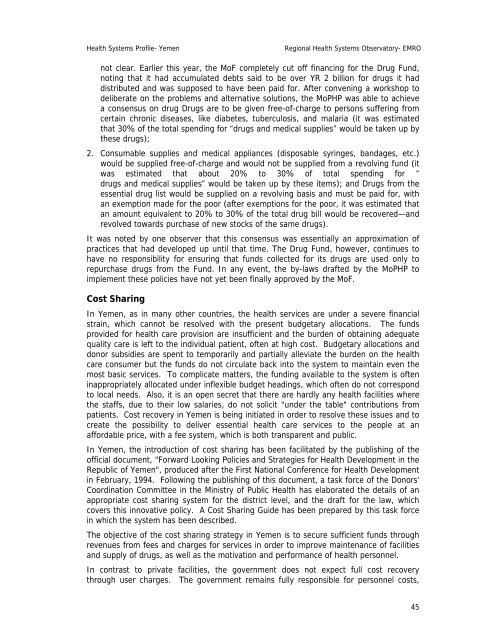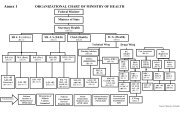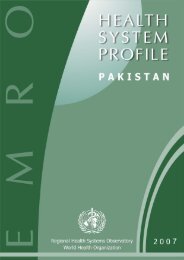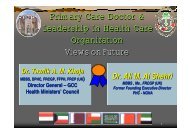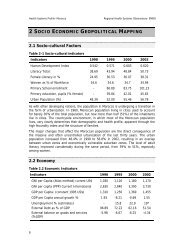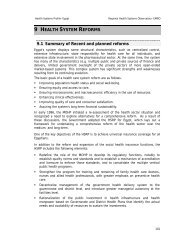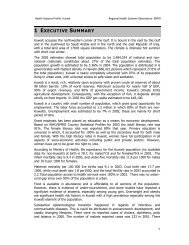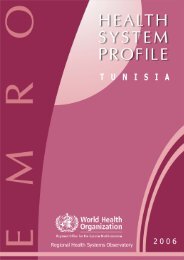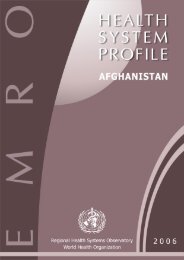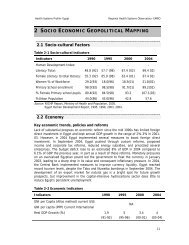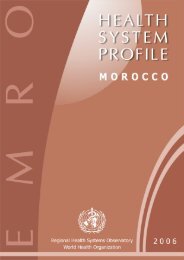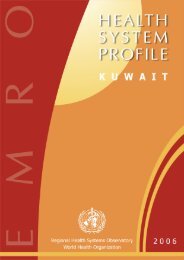Yemen - What is GIS - World Health Organization
Yemen - What is GIS - World Health Organization
Yemen - What is GIS - World Health Organization
Create successful ePaper yourself
Turn your PDF publications into a flip-book with our unique Google optimized e-Paper software.
<strong>Health</strong> Systems Profile- <strong>Yemen</strong> Regional <strong>Health</strong> Systems Observatory- EMRO<br />
not clear. Earlier th<strong>is</strong> year, the MoF completely cut off financing for the Drug Fund,<br />
noting that it had accumulated debts said to be over YR 2 billion for drugs it had<br />
d<strong>is</strong>tributed and was supposed to have been paid for. After convening a workshop to<br />
deliberate on the problems and alternative solutions, the MoPHP was able to achieve<br />
a consensus on drug Drugs are to be given free-of-charge to persons suffering from<br />
certain chronic d<strong>is</strong>eases, like diabetes, tuberculos<strong>is</strong>, and malaria (it was estimated<br />
that 30% of the total spending for “drugs and medical supplies” would be taken up by<br />
these drugs);<br />
2. Consumable supplies and medical appliances (d<strong>is</strong>posable syringes, bandages, etc.)<br />
would be supplied free-of-charge and would not be supplied from a revolving fund (it<br />
was estimated that about 20% to 30% of total spending for “<br />
drugs and medical supplies” would be taken up by these items); and Drugs from the<br />
essential drug l<strong>is</strong>t would be supplied on a revolving bas<strong>is</strong> and must be paid for, with<br />
an exemption made for the poor (after exemptions for the poor, it was estimated that<br />
an amount equivalent to 20% to 30% of the total drug bill would be recovered—and<br />
revolved towards purchase of new stocks of the same drugs).<br />
It was noted by one observer that th<strong>is</strong> consensus was essentially an approximation of<br />
practices that had developed up until that time. The Drug Fund, however, continues to<br />
have no responsibility for ensuring that funds collected for its drugs are used only to<br />
repurchase drugs from the Fund. In any event, the by-laws drafted by the MoPHP to<br />
implement these policies have not yet been finally approved by the MoF.<br />
Cost Sharing<br />
In <strong>Yemen</strong>, as in many other countries, the health services are under a severe financial<br />
strain, which cannot be resolved with the present budgetary allocations. The funds<br />
provided for health care prov<strong>is</strong>ion are insufficient and the burden of obtaining adequate<br />
quality care <strong>is</strong> left to the individual patient, often at high cost. Budgetary allocations and<br />
donor subsidies are spent to temporarily and partially alleviate the burden on the health<br />
care consumer but the funds do not circulate back into the system to maintain even the<br />
most basic services. To complicate matters, the funding available to the system <strong>is</strong> often<br />
inappropriately allocated under inflexible budget headings, which often do not correspond<br />
to local needs. Also, it <strong>is</strong> an open secret that there are hardly any health facilities where<br />
the staffs, due to their low salaries, do not solicit "under the table" contributions from<br />
patients. Cost recovery in <strong>Yemen</strong> <strong>is</strong> being initiated in order to resolve these <strong>is</strong>sues and to<br />
create the possibility to deliver essential health care services to the people at an<br />
affordable price, with a fee system, which <strong>is</strong> both transparent and public.<br />
In <strong>Yemen</strong>, the introduction of cost sharing has been facilitated by the publ<strong>is</strong>hing of the<br />
official document, "Forward Looking Policies and Strategies for <strong>Health</strong> Development in the<br />
Republic of <strong>Yemen</strong>", produced after the First National Conference for <strong>Health</strong> Development<br />
in February, 1994. Following the publ<strong>is</strong>hing of th<strong>is</strong> document, a task force of the Donors'<br />
Coordination Committee in the Min<strong>is</strong>try of Public <strong>Health</strong> has elaborated the details of an<br />
appropriate cost sharing system for the d<strong>is</strong>trict level, and the draft for the law, which<br />
covers th<strong>is</strong> innovative policy. A Cost Sharing Guide has been prepared by th<strong>is</strong> task force<br />
in which the system has been described.<br />
The objective of the cost sharing strategy in <strong>Yemen</strong> <strong>is</strong> to secure sufficient funds through<br />
revenues from fees and charges for services in order to improve maintenance of facilities<br />
and supply of drugs, as well as the motivation and performance of health personnel.<br />
In contrast to private facilities, the government does not expect full cost recovery<br />
through user charges. The government remains fully responsible for personnel costs,<br />
45


